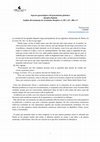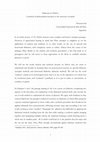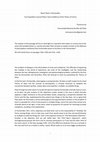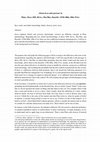Conference Presentations by Florencia Sal

La cuestión de las ágrapha dógmata surge principalmente de las siguientes afirmaciones de Platón.... more La cuestión de las ágrapha dógmata surge principalmente de las siguientes afirmaciones de Platón. En la Carta VII, 341 c-d, dice lo que sigue: "Desde luego, no hay ni habrá nunca una obra mía que trate estos temas; no se pueden, en efecto precisar cómo se hace con otras ciencias, sino que después de una larga convivencia con el problema y después de haber intimado con él, de repente, como la luz que salta de la chispa, surge la verdad en el alma y crece ya espontáneamente. Sin duda, tengo la seguridad de que, tanto por escrito como de viva voz, nadie podría exponer estas materias mejor que yo; pero sé también que si estuviera mal expuesto, nadie se disgustaría tanto como yo. […] Ahora bien, yo no creo que la discusión filosófica sobre estos temas sea como se dice, un bien para los hombres, salvo para unos pocos que están capacitados para descubrir la verdad por sí mismos con unas pequeñas indicaciones" (trad. Juan Zaragoza) En 344 c agrega: "Precisamente por ello cualquier persona seria se guardará muy mucho de confiar por escrito cuestiones serias." Y luego, en Fedro, 275 a, en contexto del mito de Theuth, dice: "Pues este invento [las letras escritas] producirá olvido en las almas de los que aprendieron, por descuidar la memoria, como si ellos por confiar en la escritura, trajeron sus recuerdos desde fuera, por caracteres ajenos, y no desde adentro por sí mismos" (trad. Maria Isabel Santa Cruz)
Sobre la paideia isocrática y su importancia en el mundo antiguo

In its initial section, 13-19, Philebus features some complex and hard to interpret passages. How... more In its initial section, 13-19, Philebus features some complex and hard to interpret passages. However, if approached bearing in mind that Plato attempts to enlighten us on the application of analysis and synthesis or, in other words, on the use of upward and downward dialectics, such complexity seems to wither. Almost from the outset of the dialogue, Plato alludes to the analytic and synthetic procedures, a fact that leads us to presuppose that he will resort to these approaches in his effort to establish whether pleasure is a good. We will use the words analysis and synthesis because we believe they are easier to understand and broader in meaning than our preconceived notions on upward dialectics (synoptic method) and downward dialectics (diarectic method). We will use the word "analysis" (analýo) in its etymological sense, that is to say, as the separation of a whole into its constituent parts, and "synthesis" (syntíthemi) as in to put in order, to reconstitute, to combine, to gather.
Plato’s Magnesian Laws are not a utopia., 2020
Plato's Laws is not an utopian construction. It is a real proposal for a real city.

About Plato"s Parmenides, five hypothesis around Plato's lack of defense of the Theory of Forms, 2020
The analysis of this passage will try to shed light on a question that makes us curious and at th... more The analysis of this passage will try to shed light on a question that makes us curious and at the same time problematizes us, namely why does Plato not give an explicit answer to the dilemma of participation (methexis) that Parmenides poses to Socrates in the Parmenides? We will mainly focus on passages 130c-133b and 133c-135d. I The problem of dialogue is the old problem of unity and multiplicity. The difficulty of explaining the multiple in the world of experience, the unity of the intelligible, and the relationship between the two. Metaphysical, ontological, and epistemological problem, outlined for the first time by Parmenides and Heraclitus, Plato will attempt to solve by postulating the Theory of Ideas. In the first part, Parmenides, interrogates a young Socrates. He does so with respect to his novel Theory of Ideas and the concept of participation, a concept necessary to establish the connection between perfect, unique Ideas and imperfect, multiple, corruptible things. Plato through Socrates seems to accept the aporiai raised by Parmenides and take them as such, so he does not give answers to the objections raised; except in the case in which Socrates opposes a slight resistance to the parmenidean attack, proposing a comparison between the Forms and the day, explaining that they extend over things as the day does. Let us agree that Plato does not formulate a serious philosophical and argumentative solution to the problem of how it is possible for a Form to be present in multiple things, and at the same time remain one. Aristotle seems to be right, in that sense, when he questions his teacher for resorting to empty metaphors, avoiding a true explanation. In Parmenides 130 c-133 b, objections are dealt with, such as the impossibility of "dividing" the Forms among things, since in that case, each Form would cease to be One and would become as multiple as empirical things are. Such is the argument known as "the Participation Dilemma". Another is the objection that we will called later "the Third Man's Argument", which homogeneously groups the Form and its sensitive participants as if one and the other were of the same nature. In the later passage 133b-135 d the difference between Form as a concept in the soul and Form as a model in reality, raised. Which leads us to an even bigger predicament,
Papers by Florencia Sal
VII Jornadas de Filosofía Política: justicia y sociedad. Actas, 2024
Reflexiones sobre nomos physis en República I
Justicia, derechos y libertades , 2023
Sobre el diseño de la ciudad de Magnesia en Leyes de Platón
Actas XIX Congreso Nacional de Filosofía AFRA, 2021
Algunas apreciaciones respecto del pasaje 130c-133 b y 133c-135d
A Parte Rei: revista de filosofía, 2000
El relato de Er se encuentra al finalizar la República. Platón tiene como costumbre hacer alguna ... more El relato de Er se encuentra al finalizar la República. Platón tiene como costumbre hacer alguna reflexión respecto del mito expuesto, lo que no sucede en este caso. ¿Por qué terminar la República con ese relato? ¿Por qué no explicarlo?. En su obra, Platón se ha ocupado, partiendo del tema de la justicia, de problemas políticos, éticos, psicológicos, gnoseológicos, metafísicos. Estos últimos se hacen manifiestos al exponer el relato de Er.
II Jornadas internas del Depto. Filosofia 2021, 2022
Tensiones temporales e indeterminación en la reflexión de Martin Seel sobre el cine .....
El relato de Er se encuentra al finalizar la Republica. Platon tiene como costumbre hacer alguna ... more El relato de Er se encuentra al finalizar la Republica. Platon tiene como costumbre hacer alguna reflexion respecto del mito expuesto, lo que no sucede en este caso. ?Por que terminar la Republica con ese relato? ?Por que no explicarlo?. En su obra, Platon se ha ocupado, partiendo del tema de la justicia, de problemas politicos, eticos, psicologicos, gnoseologicos, metafisicos. Estos ultimos se hacen manifiestos al exponer el relato de Er. En el se mencionan, la cuestion de la supervivencia del alma despues de la muerte, la del sufrimiento en relacion con el aprendizaje de las verdades ultimas de la vida, la de la libertad para elegir la virtud, la de la estructura del mundo, y la diferencia entre vida justa e injusta. A continuacion expondremos brevemente el mito y analizaremos sus caracteristicas a fin de responder a nuestra pregunta inicial.
The Ancient Age introduces uncountless problems to the specialists of the same one. On one hand, ... more The Ancient Age introduces uncountless problems to the specialists of the same one. On one hand, we have problems related with the direct sources, and, for other, with the indirect sources. Same Plato points out, in the Letter VII , that his dialogues don’t contain the fundamental teachings, but it belongs exactly to him of who the work is conserved in its entirety. There is our problem : What to make? To discredit the platonic work in benefit of a supposed non existent doctrine? To reconstruct a doctrine having already one written by the own Plato? Inevitably this platonic statement raises the problem that is denominated as the occult doctrine or not written doctrine.
Many years ago, I came across a quote in a Havelock book, Aux origines de la civilization écrite ... more Many years ago, I came across a quote in a Havelock book, Aux origines de la civilization écrite en Occident, which caught my attention to such an extent that I did not stop thinking about it until today.
A Parte Rei Revista De Filosofia, 2000
Plato' s Law, from Theory into Practice, 2003
Teaching Documents by Florencia Sal
Drafts by Florencia Sal

Doxa (opinion, belief) and episteme (knowledge, science) are different concepts in Plato epistemo... more Doxa (opinion, belief) and episteme (knowledge, science) are different concepts in Plato epistemology. Regarding this two, belief and knowledge, in Meno (85b, 86 b-c, 96a-98a), and Republic (476b-480a, 506e-511e) there are also a different treatment and perspective. I will try to prove that this dissimilarity is just shallow because its holds in two diverse point of view grounded in the background each dialogue. I The purpose that will guide the following pages will be to analyze the differences that arise in the interpretations regarding true opinion 1 and knowledge. I will refer specifically to the passages in Meno 85b, 86 b-c, 96a-98a, in which Plato postulates that true belief could reach the status of knowledge, and to those in the Republic 476b-480a, 506e-511e, mainly, in the Divided Line but also the ones about philodoxoi, in which he seems to modify his criterion, saying doxa is different from knowledge, and excluding the possibility that the first could be transformed into the second. If there is a difference between both positions, then I ask myself the following questions: Is it possible that Plato has changed his way of thinking? Is it a conceptualization adjustment regarding both terms? Is it a change of context in which the theme? Is it a different look of the theme with different characteristics due to the context? We will examine the passages of both dialogues trying to reach a possible answer.
Uploads
Conference Presentations by Florencia Sal
Papers by Florencia Sal
Teaching Documents by Florencia Sal
Drafts by Florencia Sal